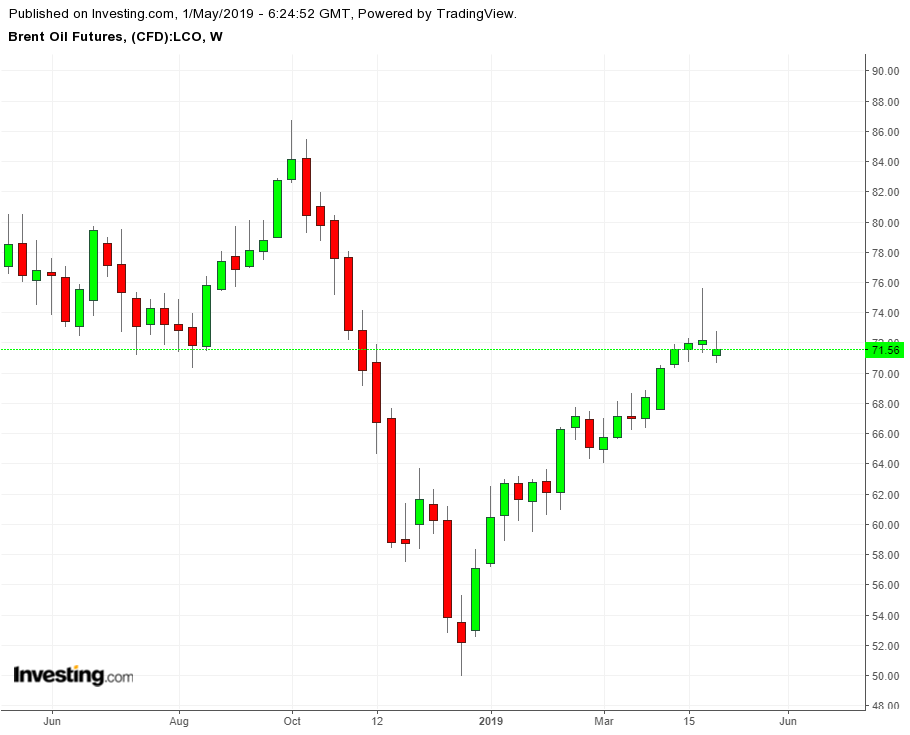It looks like the Saudis have decided to give the U.S. President a little payback for the near $40 per barrel misery they endured last winter.
Saudi Energy Minister Khalid al-Falih’s clear disregard of Donald Trump’s attempt to corner OPEC into another production hike via a phone call supposedly placed to a mysterious source at the cartel tells us that Riyadh is digging its heels in for a fight with the White House over control of the world oil market.
No Output Hike; More Cuts Maybe, Say Saudis
Falih said the June meeting of OPEC+, which includes Russia, might actually extend production cuts till the year-end, rather than end them.
It’s interesting that his comments, made to Moscow-based news service RIA, came a day after Russian President Vladimir Putin gently reminded the Saudis that it was him, not Trump, who came to their rescue last year when OPEC was floundering. It makes sense, therefore, for the Saudi energy minister to seek common ground with his Russian counterpart Alexander Novak in ensuring supplies stay tight enough for oil to remain a seller’s market.

The popular theory is Saudi Arabia needs its oil to be around $80 a barrel to fund its budget. The IMF said earlier this week that the Kingdom needs the market to move up to $85 at least. Oil historian and Forbes senior contributor Ellen R. Wald, who also writes a weekly column for Investing.com, argues that neither is true. “Historically, Saudi Arabia has sought to maintain reasonable oil prices instead of prioritizing only high prices, because high oil prices lead to global recessions which depress oil demand,” she said in a Forbes post this week.
Production Cuts Also Political For Russia?
Putin’s stance itself is quite mystifying as Russia’s sovereign wealth fund chief Kirill Dmitriev and oil giant Rosneft’s (OTC:OJSCY) head Igor Sechin have cautioned in recent months that production cuts were costing their nation lost market share to U.S. crude.
These Russian oligarchs are openly pushing for more production to foster healthy competition in the world oil market. First Deputy Prime Minister Anton Siluanov said in December that Russia’s budget needed crude to be only at $42 a barrel.
So, if the economy isn’t the answer for Putin’s action, then politics is probably it, since Trump’s actions are also hurting Iran, one of Russia’s most important allies.
Saudi-Iran Relationship An Enigma Within OPEC
The Saudis, meanwhile, appear to have the best of three worlds as the Russians remain on their side, Trump unwittingly keeps oil at above $70 through his sanctions and their favorite enemy Iran gets the roast. To analysts covering OPEC, the relationship between the Saudis and Iranians must be an enigma, given their facade as brothers bonded for the common good of a vital commodity, while being ready to drive the stake into each other at the first opportunity.
For traders though, the actions of the U.S.-Saudi-Russian triumvirate are muddying the outlook for oil again.
Just a week ago, crude prices appeared destined to go only higher with the ban on Iranian oil, separate U.S. sanctions on Venezuela and unplanned outages in Libya and Angola all coming together to bear maximum upward pressure on a market that had already risen 32% in the first quarter.
But in Tuesday’s trade, even with fighting breaking out on the streets of Caracas between the forces of Venezuelan President Nicholas Maduro and his challenger Juan Guaido, oil prices could rise no more than half percent on the day and 6% for all of April. It doesn’t help that even in Venezuela, Maduro is backed by Putin while Guaido is Trump’s choice.
Trump Remains A Dangerous Wild Card To The Oil Market
With Trump back to first base with his quest for low gasoline prices ahead of the 2020 presidential elections, there’s no telling what he’ll do next. He has thus far been the most creative White House occupant when it comes to meddling with oil prices, and remains a dangerous wild card to the market as U.S. crude inventories start rising again.
Against the wishes of Iran hawks in his administration and Congress, rumor has it that Trump might still do a number on OPEC by giving China a special exemption to import from Tehran—especially if the cartel doesn’t play ball in raising output. Given his propensity for policy-making on-the-fly, it’s quite believable that he could resort to something like that.
While China has only been consuming about 500,000 barrels per day of Iran’s 1.1 million bpd output, it’s the impact of the Trump action that might matter to market sentiment—and help bring prices down. Of course, the Saudis and the Russians might cut even more barrels after that, leaving traders in an even more hapless state on market direction, especially if U.S. crude stockpiles continue growing.
